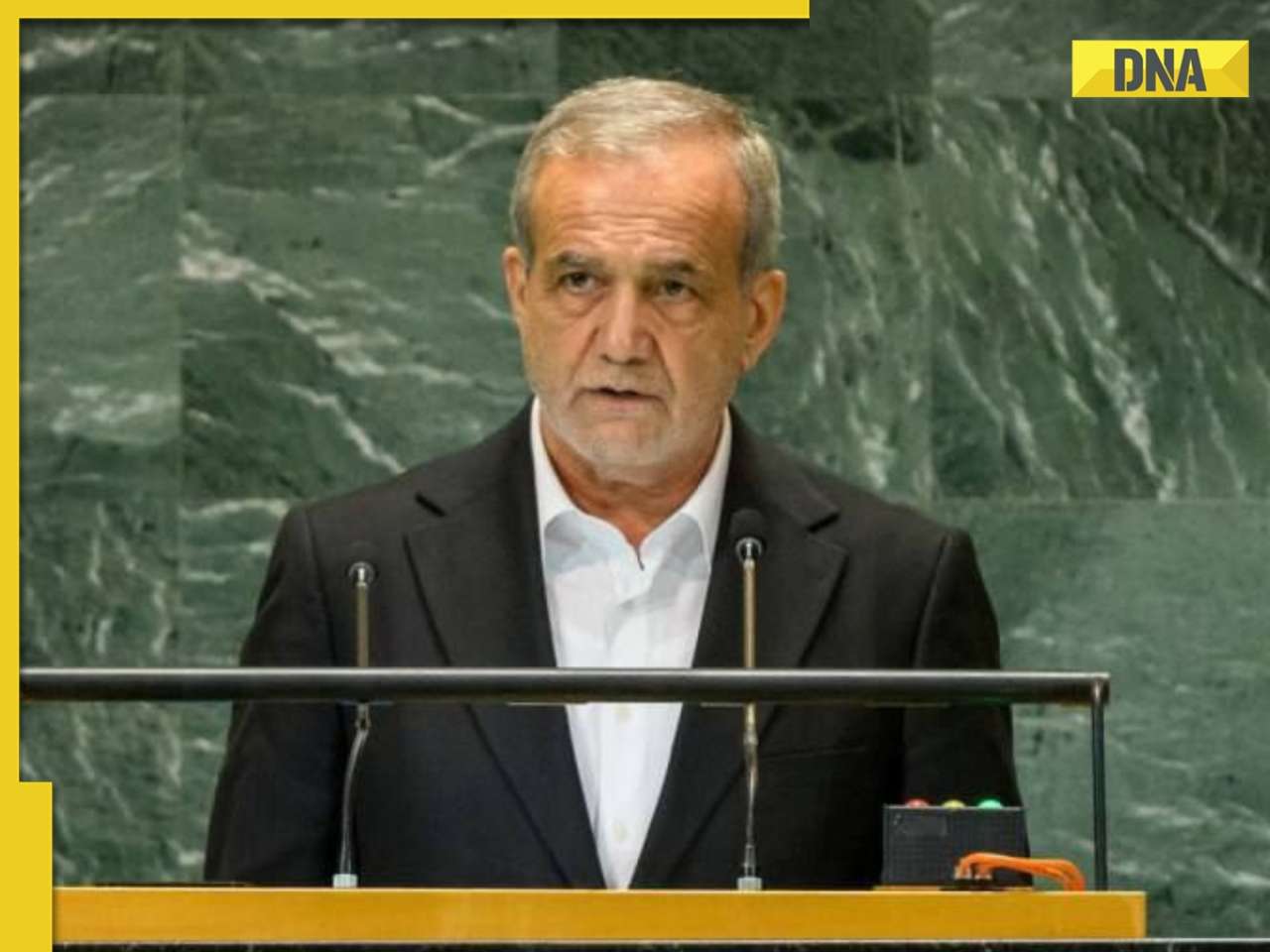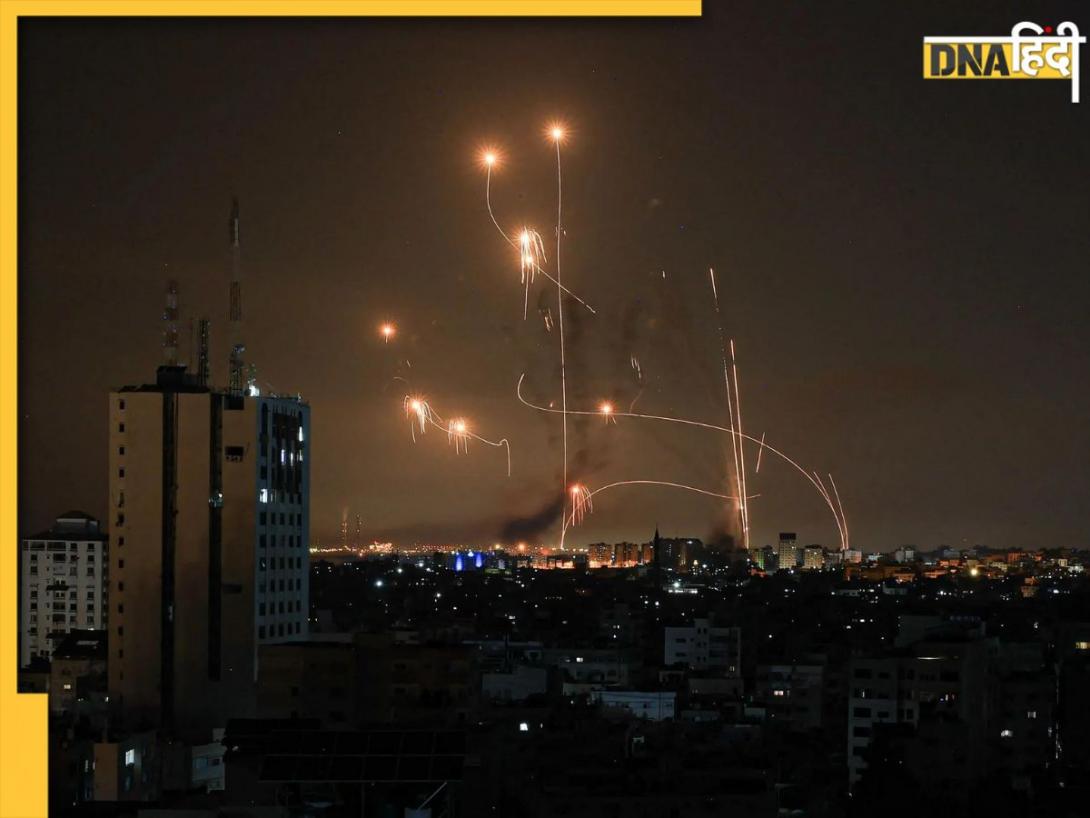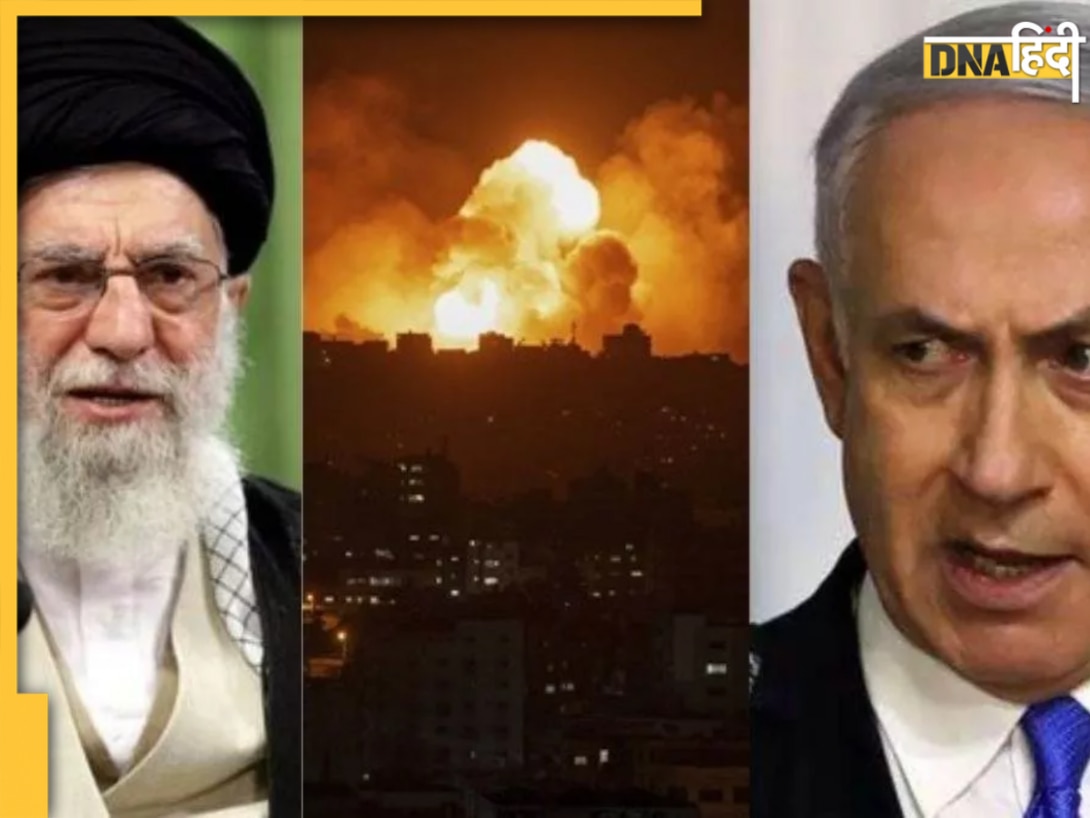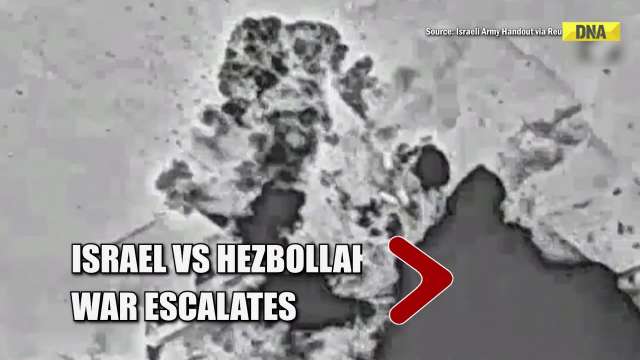The Israeli military, which initially estimated that around 180 missiles were launched at Israel, warned that the attack "will have consequences."
Iran launched a missile attack on Israel on Tuesday, 1st October, triggering sirens throughout the country. People on the ground witnessed dozens of missiles over Tel Aviv, Jerusalem, and Haifa.
New videos show that an Israeli air base was hit in the Iranian attack, while the IDF reported that it carried out "a large number of interceptions." Iran’s Islamic Revolutionary Guard Corps stated the attack targeted Israeli security and military sites in retaliation for the killing of Hezbollah leader Hassan Nasrallah and others.
The Israeli military, which initially estimated that around 180 missiles were launched at Israel, warned that the attack "will have consequences."
Earlier, the US said it believed Iran was preparing to launch a ballistic missile attack on Israel, following Israel’s ground operation in southern Lebanon against the Iran-backed Hezbollah. Israeli officials referred to the offensive in Lebanon as "localized raids."
Iran’s military chief stated that Tuesday’s missile attack was aimed only at military targets but warned that wider strikes could follow if Israel retaliates.
Major General Mohammad Bagheri stated that Iran had targeted military sites, including the Mossad intelligence agency, Nevatim Air Base, Hatzor Air Base, radar systems, and groups of Israeli tanks, even though they had the capability to carry out a much larger attack.
He stated on Wednesday, 2nd October, "We had the ability to strike the regime's economic infrastructure, but we chose to target only military bases."
He also issued a warning to Israel and its allies.
He stated, "If Israel is not restrained and takes action against Iran, we will target all of its infrastructure.
Bagheri stated that the strikes on Israel were in response to the assassinations of Ismail Haniyeh, Hassan Nasrallah, and Abbas Nilforoushan, as reported by CNN.
Nasrallah, who led the Iran-backed Lebanese militant group Hezbollah for over 30 years, was killed in an Israeli airstrike on his underground headquarters in Beirut on Friday, 27th September.
Nilforoushan, a senior commander in Iran's Islamic Revolutionary Guard Corps, was killed alongside him, according to reports from Iranian state media.
Hamas political leader Haniyeh was assassinated in Tehran in July with an explosive device that had been secretly placed in the guesthouse where he was staying, according to a source familiar with the matter, as reported by CNN.
The Iranian government and Hamas claim that Israel was responsible for the assassination, but Israel has neither confirmed nor denied its involvement.
Since the assassination of Martyr Haniyeh, we have exercised restraint during a challenging time, as requested repeatedly by the Americans and Europeans, who urged us to hold off to help establish a ceasefire in Gaza. However, after the deaths of Sayyed Hassan Nasrallah and Commander Nilforoushan, the situation became unbearable," Bagheri said.
(The author of this article is an Aerospace & Defence Analyst based in Bengaluru. He is also Director of ADD Engineering Components, India, Pvt. Ltd, a subsidiary of ADD Engineering GmbH, Germany)
(Disclaimer: The views expressed above are the author's own and do not reflect those of DNA)
![submenu-img]() Iran launches dozens of ballistics missile at Israel, shelter-in-place order issued
Iran launches dozens of ballistics missile at Israel, shelter-in-place order issued![submenu-img]() Diplomatic Discord: Lebanon's Crisis and Iran's Strategic Posturing
Diplomatic Discord: Lebanon's Crisis and Iran's Strategic Posturing![submenu-img]() Watch: Shark Tank India season 4 starts filming with OG judges and new hosts, netizens ask premiere date
Watch: Shark Tank India season 4 starts filming with OG judges and new hosts, netizens ask premiere date![submenu-img]() Dera chief, rape convict Gurmeet Ram Rahim gets parole ahead of Haryana elections
Dera chief, rape convict Gurmeet Ram Rahim gets parole ahead of Haryana elections![submenu-img]() Top Nephrologists of the country: Redefining excellence in Renal Care
Top Nephrologists of the country: Redefining excellence in Renal Care![submenu-img]() Who is Vaibhav Surya Suryavanshi, 13 year old prodigy
Who is Vaibhav Surya Suryavanshi, 13 year old prodigy
![submenu-img]() 9 sexy photos of XXX star Aabha Paul that are 'too hot to handle'
9 sexy photos of XXX star Aabha Paul that are 'too hot to handle'![submenu-img]() Preity Zinta shares 'sweetest way' to survive late night shoot
Preity Zinta shares 'sweetest way' to survive late night shoot![submenu-img]() Impressive educational qualification of Triptii Dimri
Impressive educational qualification of Triptii Dimri ![submenu-img]() Diabetes tips: 6 fruits with high GI to avoid spike in blood sugar levels
Diabetes tips: 6 fruits with high GI to avoid spike in blood sugar levels![submenu-img]() Israel-Iran War: फिर इजरायल का रक्षा कवच बना आयरन डोम, सैकड़ों मिसाइलों को किया हवा में ही खत्म
Israel-Iran War: फिर इजरायल का रक्षा कवच बना आयरन डोम, सैकड़ों मिसाइलों को किया हवा में ही खत्म![submenu-img]() WhatsApp में दिख रहे ये बदलाव तो हो जाएं सावधान, हो सकता है अकाउंट हैक
WhatsApp में दिख रहे ये बदलाव तो हो जाएं सावधान, हो सकता है अकाउंट हैक ![submenu-img]() Govinda Health Update: पुलिस ने सीज की लाइसेंसी रिवॉल्वर, यहां जानें अब कैसा है गोविंद का हाल
Govinda Health Update: पुलिस ने सीज की लाइसेंसी रिवॉल्वर, यहां जानें अब कैसा है गोविंद का हाल![submenu-img]() Iran-Israel War: इजरायल और ईरान में थी पहले जिगरी दोस्ती, जानें कैसे बने एक-दूसरे के कट्टर दुश्मन
Iran-Israel War: इजरायल और ईरान में थी पहले जिगरी दोस्ती, जानें कैसे बने एक-दूसरे के कट्टर दुश्मन![submenu-img]() दीवाली सेल के बीच Online shopping में हो रहे फ्रॉड, बिना ऑर्डर के पहुंच रहे पार्सल, जानें पूरा मामला
दीवाली सेल के बीच Online shopping में हो रहे फ्रॉड, बिना ऑर्डर के पहुंच रहे पार्सल, जानें पूरा मामला![submenu-img]() BMW launches CE 02 electric scooter in India; price starts at Rs…
BMW launches CE 02 electric scooter in India; price starts at Rs…![submenu-img]() Mahindra Thar Roxx 4x4 prices revealed, starts at Rs…
Mahindra Thar Roxx 4x4 prices revealed, starts at Rs…![submenu-img]() Sebi gives nod to Hyundai India's Rs 20,000 crore IPO, listing month is...
Sebi gives nod to Hyundai India's Rs 20,000 crore IPO, listing month is...![submenu-img]() Tata launches Nexon iCNG, check price, mileage, other features
Tata launches Nexon iCNG, check price, mileage, other features![submenu-img]() This Indian car brand set to acquire 50% stake in Skoda Auto Volkswagen India, deal will cost Rs…
This Indian car brand set to acquire 50% stake in Skoda Auto Volkswagen India, deal will cost Rs…![submenu-img]() Meet woman, who is social media star, is married to IAS, cracked UPSC exam in first attempt, secured AIR...
Meet woman, who is social media star, is married to IAS, cracked UPSC exam in first attempt, secured AIR...![submenu-img]() Meet Indian genius who cracked IIT-JEE with AIR 1, joined IIT Bombay, left after 2 years without graduation, he is now…
Meet Indian genius who cracked IIT-JEE with AIR 1, joined IIT Bombay, left after 2 years without graduation, he is now…![submenu-img]() Meet boy who started his company at 13, got inspiration from Mumbai's Dabbawalas, his business is...
Meet boy who started his company at 13, got inspiration from Mumbai's Dabbawalas, his business is...![submenu-img]() CAT 2024 application correction window closes today; check how to make changes, direct link here
CAT 2024 application correction window closes today; check how to make changes, direct link here![submenu-img]() Meet woman who left high-paying job at US govt agency for UPSC exam, became IAS officer with AIR...
Meet woman who left high-paying job at US govt agency for UPSC exam, became IAS officer with AIR...![submenu-img]() After Hassan Nasrallah's Death, This Cleric Is Now Tipped To Be Hezbollah Leader | Israel | Lebanon
After Hassan Nasrallah's Death, This Cleric Is Now Tipped To Be Hezbollah Leader | Israel | Lebanon![submenu-img]() Hashem Safieddine, Cousin Of Hassan Nasrallah To Become Hezbollah's New Chief | Israel-Lebanon War
Hashem Safieddine, Cousin Of Hassan Nasrallah To Become Hezbollah's New Chief | Israel-Lebanon War![submenu-img]() Israel Hezbollah War: Nasrallah's Death, A Turning Point for Hezbollah's Future? Experts Explain
Israel Hezbollah War: Nasrallah's Death, A Turning Point for Hezbollah's Future? Experts Explain![submenu-img]() Israel Hezbollah War: Hassan Nasrallah's Death Leads To Protests In J&K, Ex-CM Mehbooba Mufti Reacts
Israel Hezbollah War: Hassan Nasrallah's Death Leads To Protests In J&K, Ex-CM Mehbooba Mufti Reacts![submenu-img]() Israel Hezbollah War: Nasrallah's Death Leads To Protest By Women & Children In Jammu And Kashmir
Israel Hezbollah War: Nasrallah's Death Leads To Protest By Women & Children In Jammu And Kashmir![submenu-img]() Best Nutrition Software in India: Prim Transformed Dt. Renu Puri’s Business
Best Nutrition Software in India: Prim Transformed Dt. Renu Puri’s Business![submenu-img]() Sebi tightens F&O rules to curb speculative trading, to be effective from THIS date
Sebi tightens F&O rules to curb speculative trading, to be effective from THIS date![submenu-img]() Mukesh Ambani's Reliance faces market turbulence as it loses Rs 80000 crore in just 48 hours
Mukesh Ambani's Reliance faces market turbulence as it loses Rs 80000 crore in just 48 hours![submenu-img]() BMW launches CE 02 electric scooter in India; price starts at Rs…
BMW launches CE 02 electric scooter in India; price starts at Rs…![submenu-img]() Anil Ambani ready to SHAKE UP market after board's approval to raise Rs 2,930 crore
Anil Ambani ready to SHAKE UP market after board's approval to raise Rs 2,930 crore![submenu-img]() Dera chief, rape convict Gurmeet Ram Rahim gets parole ahead of Haryana elections
Dera chief, rape convict Gurmeet Ram Rahim gets parole ahead of Haryana elections![submenu-img]() Manoj Gupta: Visionary Leader in IT Distribution
Manoj Gupta: Visionary Leader in IT Distribution![submenu-img]() Sadhguru’s Isha foundation raided by 150 police officers after father alleges daughters being held hostage
Sadhguru’s Isha foundation raided by 150 police officers after father alleges daughters being held hostage![submenu-img]() Tirupati laddu row: SIT probe into 'adulteration' temporarily stalled until SC hearing
Tirupati laddu row: SIT probe into 'adulteration' temporarily stalled until SC hearing![submenu-img]() Expert Insights from Rohit Reddy Chananagari Prabhakar on Advanced Data Management in Medical Education
Expert Insights from Rohit Reddy Chananagari Prabhakar on Advanced Data Management in Medical Education












































)
)
)
)
)
)
)
)
)
)
)
)
)
)
)





)
)
)
)
)
)